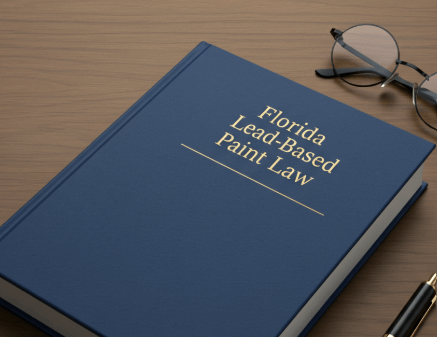Lead-based paint poses a severe health hazard, particularly to children and pregnant women. That’s why lead-based paint laws are not to be taken lightly—whether you’re a property owner, a real estate agent, or a tenant. In Florida, lead-based paint regulations are particularly stringent, focusing on preventing lead poisoning by carefully managing lead-based paint hazards in properties. This comprehensive guide will explore the Florida Lead-Based Paint Law, unpacking what it means for different stakeholders and providing practical tips for ensuring your properties comply with the regulations. From the historical context to the current legislation, join us as we peel back the Florida Lead-Based Paint Law layers to reveal how you can color within the lines and protect the well-being of those around you.
Real estate investors Steve Daria and Joleigh emphasize the importance of understanding the Florida Lead-Based Paint Law to ensure compliance and safety in their properties. Their commitment to these regulations highlights such laws’ critical role in protecting tenants and their investments’ integrity.
The Paint That Haunts Homes
Due to its durability and vibrant hues, lead-based paint has a long history in constructing homes and public buildings.
However, the same properties that made it famous also make it a persistent concern long after it’s no longer in vogue.
The widespread use of lead-based paint, particularly in pre-1978 properties, continues to be a risk factor for lead poisoning.
This serious condition can lead to developmental delays and a range of other health issues.

The Silent Threat
Lead-based paint is hazardous when it deteriorates, chips, peels, or becomes household dust.
This fine dust is easily ingested, and it’s particularly dangerous to young children.
Even small amounts of lead-contaminated dust can have severe, irreversible health consequences.
The Florida Lead-Based Paint Law: Intent and Implementation
The Florida Lead-Based Paint Law primarily intends to prevent lead poisoning by identifying and appropriately managing lead-based paint hazards.
The law combines state and federal regulations, making it more rigorous than in other states.
Scope of the Regulations
The regulations apply to all properties built before 1978 and target:
- Renovation Work: Any contractors or firms undertaking renovation work on older properties must be approved by the Environmental Protection Agency (EPA) and abide by specific work practices designed to minimize lead dust generation.
- Residential Properties: Landlords and sellers of housing built before 1978 must provide renters and buyers with information about lead-based paint hazards in the dwelling.
- Child-Occupied Facilities: The law focuses on lead-based paint hazards in areas where young children are most likely to spend time, such as daycares and schools.
Get An Offer Today, Sell In A Matter Of Days
Understanding the Regulation
The Florida Lead-Based Paint Law consists of several key components that govern how lead-based paint risks are managed.
Risk Assessment
This is an extensive evaluation of potential lead hazards in a dwelling.
It involves inspecting all painted surfaces and taking samples to determine the lead concentration.
Abatement
Property owners must take action to minimize the risk if high lead levels are found.
Abatement involves permanently removing or sealing lead-based paint to ensure it does not pose a hazard.

Ongoing Monitoring
For properties where lead hazards have been identified and controlled, periodic reevaluations must be made to confirm the risk remains low.
Application to Real Estate and Property Management
Real estate professionals are on the front lines of lead-based paint regulation, ensuring that both sellers and buyers are informed and compliant.
Seller Disclosure
A property seller in Florida must disclose and provide a Risk Assessment or a Letter of Lead-Free Conditions to the potential buyer before entering into a purchase agreement.
Leasing Responsibilities
Landlords must provide tenants with a pamphlet from the EPA on lead-based paint risks and a lead warning statement as part of their lease agreement.
Property Managers
For those overseeing properties where renovations are planned, it is critical to ensure that only certified contractors and firms are employed and that the proper renovation protocols are followed.
For the Homeowner and Renter
For homeowners and renters in Florida, lead-based paint laws cement certain rights and responsibilities that must be taken seriously.
Home Purchase and Renovations
Before purchasing a home containing lead-based paint, familiarize yourself with the law’s requirements and ensure that necessary inspections and protocols are followed during renovations.
Tenant Rights
Tenants have the right to learn about lead hazards in their homes.
You can ask for an assessment if you suspect your home has lead-based paint.
Protecting Children
If you have young children, it’s essential to understand the risks and adjust your living environment to minimize exposure to lead.
The Financial Implications
Non-compliance with lead-based paint laws can result in fines, legal action, and reputational damage for those involved.
Cost of Abatement
The financial outlay for lead-based paint abatement can be significant, but it is an investment in the safety and value of the property.
Legal Fees
If non-compliance with lead-based paint laws leads to legal action, the costs can quickly escalate.
Long-Term Savings
Proactively managing lead risks can lead to long-term savings by avoiding the need for more extensive remediation and, most importantly, protecting residents’ health.
Your Action Plan for Lead-Based Paint Law Compliance
Compliance with Florida’s Lead-Based Paint Law requires a proactive and informed approach.
Here’s how to ensure you’re following the law and protecting the health of those in your care.
Stay Informed
Continually educate yourself on the latest regulations and best practices for managing lead-based paint.
The EPA and local health departments are excellent sources of information.
Work with Certified Professionals
Whether for a property assessment, reduction, or renovation, partner only with licensed and certified professionals well-versed in lead safety protocols.
Maintain a Compliance Record
Keep detailed records of any assessments, discounts, or risk management measures taken on your property.
This documentation will be crucial to demonstrate compliance should the need arise.
Educate Tenants and Residents
Communication is critical in lead risk management.
Regularly share information about lead hazards and the steps to address them with those who live and work on your properties.
FAQs About Florida’s Lead-Based Paint Law
This section addresses the most common questions regarding Florida’s regulations on lead-based paint, ensuring you have the essential information needed for compliance.
Who is responsible for disclosing lead-based paint hazards?
Sellers and landlords are responsible for revealing lead-based paint hazards to buyers and tenants.
Are there penalties for non-compliance?
Yes, non-compliance can result in fines, legal action, and increased liability.
Can lead-based paint be wholly removed from a property?
Lead-based paint can be permanently removed or sealed through abatement to prevent exposure.
Conclusion
The Florida Lead-Based Paint Law is a critical framework for managing the risks associated with lead-based paint in properties. Whether you’re a homeowner, tenant, real estate agent, or property manager, understanding and adhering to these regulations is essential to maintaining a safe environment.
Coloring within the Lead-Based Paint Law lines isn’t just about following the rules; it’s about demonstrating a commitment to your community’s health and future generations’ well-being. Take the time to educate yourself, take the necessary precautions, and lead by example.
**NOTICE: Please note that the content presented in this post is intended solely for informational and educational purposes. It should not be construed as legal or financial advice or relied upon as a replacement for consultation with a qualified attorney or CPA. For specific guidance on legal or financial matters, readers are encouraged to seek professional assistance from an attorney, CPA, or other appropriate professional regarding the subject matter.

